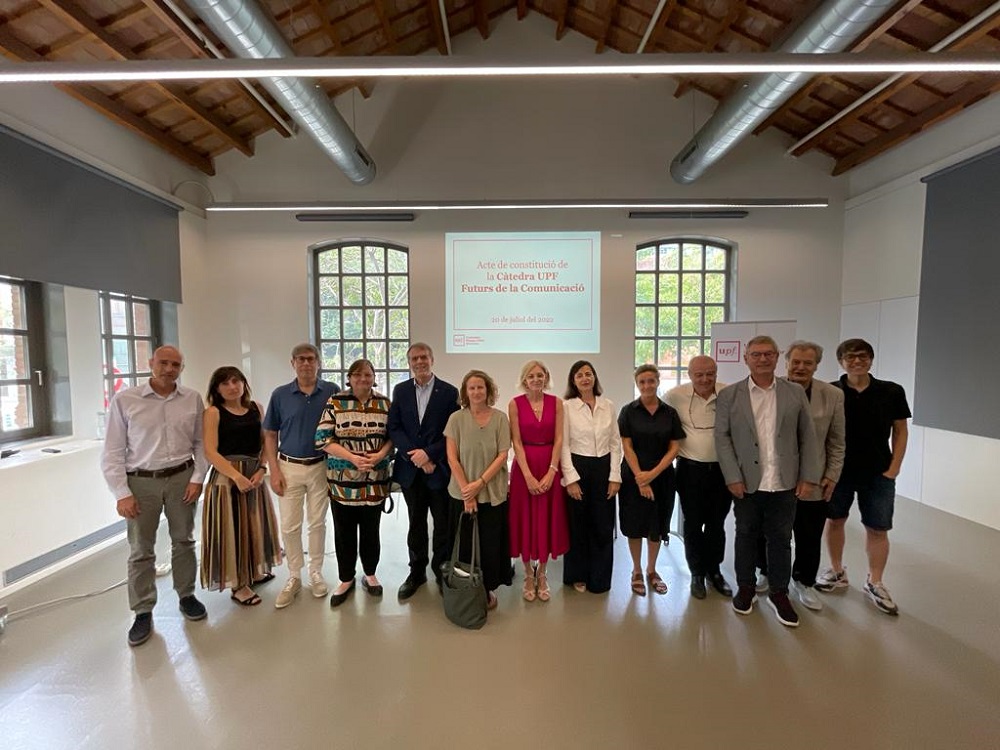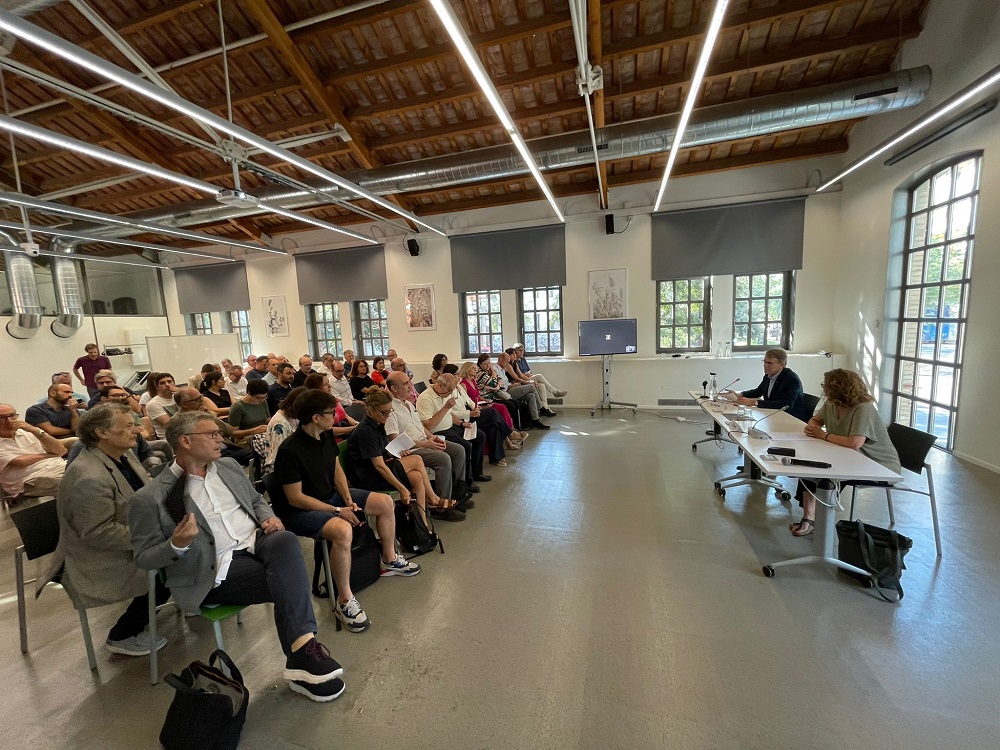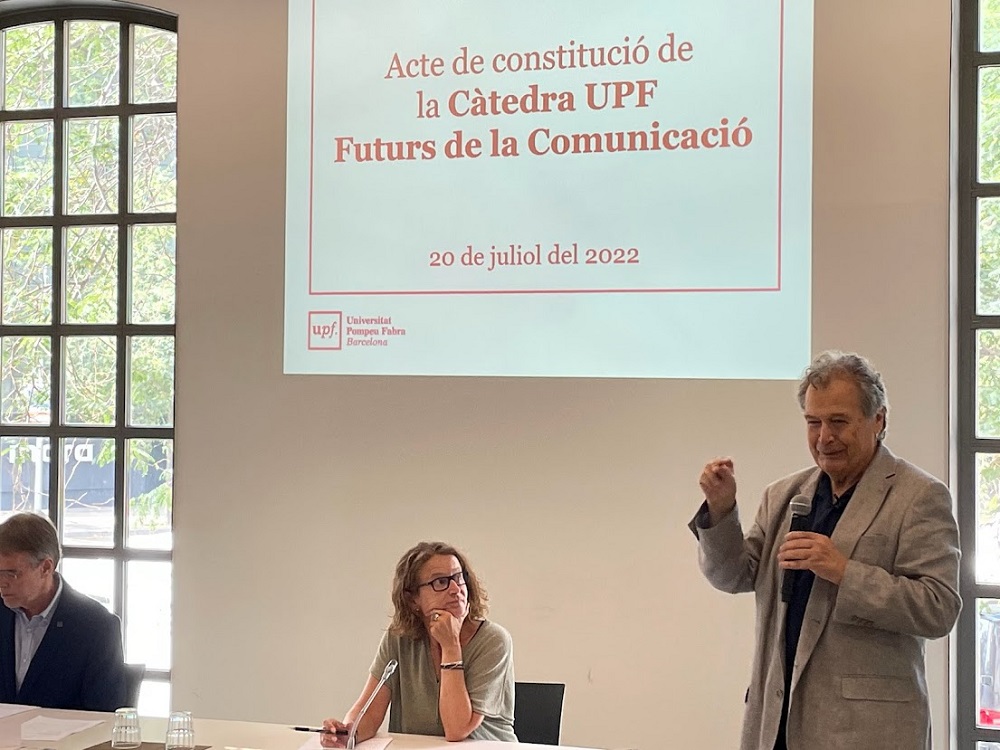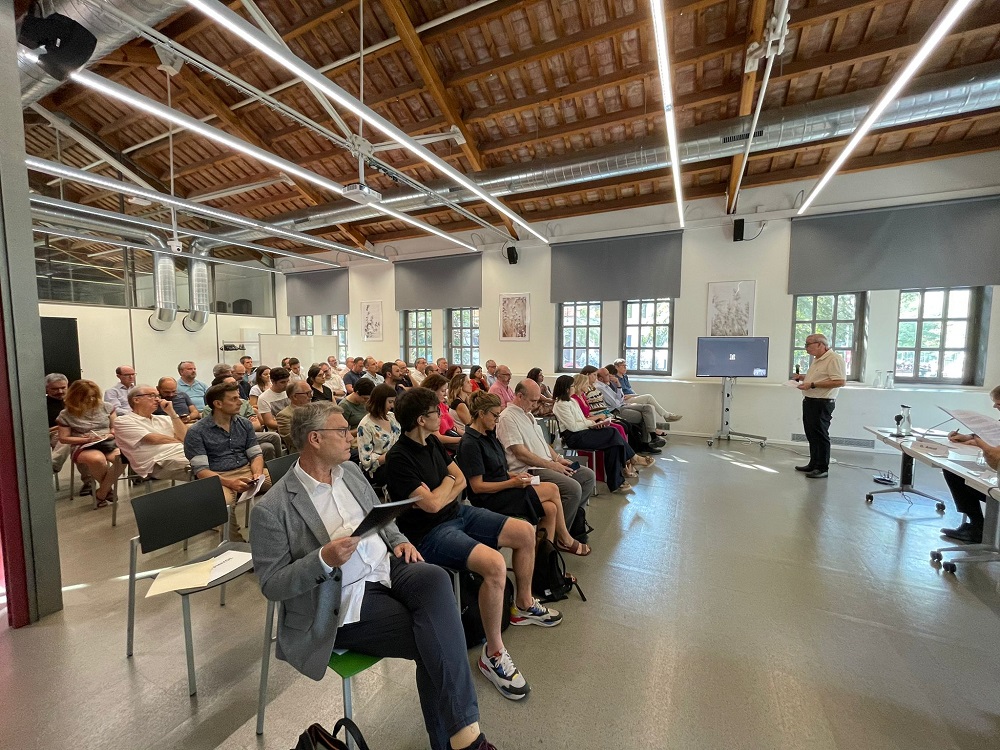Pompeu Fabra University and various companies and institutions in the communication sector launch the Futures of Communication UPF Chair
Pompeu Fabra University and various companies and institutions in the communication sector launch the Futures of Communication UPF Chair
The Chair, an initiative of the UPF Department and Faculty of Communication, aims to join forces between the different actors of the communication sector, relying on prospection, to promote collective research in this area. In addition to UPF, the Chair initially involves fourteen founding companies and institutions, and remains open to other entities that believe that knowledge of the ongoing transformations in the communication landscape can be expanded.

On 20 July, UPF’s Poblenou campus hosted the presentation of the Futures of Communication UPF Chair, promoted by the University’s Department and Faculty of Communication. The Chair’s main objective is to join forces between the different actors of the communication sector to promote collective research in this area and be able to understand possible and probable future scenarios, for the benefit of society as a whole.
The event, which took place in La Nau hall, was attended by Oriol Amat, UPF rector, Eulàlia de Nadal, vice-rector for Knowledge Transfer, and Jordi Balló, director of the Department of Communication and director of the Chair, who each gave a speech. The dean of the UPF Faculty of Communication, Carles Pont, was present, as were other professors of the UPF Department of Communication.
Jordi Balló: “Here at the Department and the Faculty of Communication we have promoted this Chair taking a necessity into account: to be able to look prospectively at the future of communication space”
The event was attended by representatives of the fourteen companies and institutions from the world of communication (barring three of the entities) that belong to the Chair: Betevé, Grup Havas (Dioni Mata, director of research), Lavinia (Antoni Esteve, chairman), Mediapro (M. Carmen Fernández, director of innovation and new businesses), Vilaweb (Assumpció Maresma, editor), Diari ARA (Esther Vera, director), Filmin, Broadcaster (Noemí Cuní, director), Clúster Audiovisual (Miquel Rutllant, chairman), Xarxa Audiovisual Local (Joan Catà, journalist), Associació de Mitjans d’Informació i Comunicació (Ramon Grau, chairman), Eurecat (Xavier Cubeles, technology consultant), Cugat Mèdia and Layers of Reality (Jordi Sellas, director).

Building bridges with organizations, companies and society at large
Jordi Balló, director of the UPF Department of Communication and of the Chair, stressed that “here at the Department and the Faculty of Communication we have promoted this Chair taking a necessity into account: to be able to look prospectively at the future of communication space. It is very common in the field of communication and culture to think in immediate terms, and very difficult to do so looking five or ten years ahead. This is the challenge, which we believe responds to a need, as demonstrated by the ability of this Chair to bond as founding partners the most innovative companies and institutions in the various sectors of communication”, he explained.

Meanwhile, Eulàlia de Nadal, vice-rector for Knowledge Transfer, stressed that "for UPF it is very important to build bridges with organizations, companies and society in general, bridges that must be bi-directional”. After congratulating Jordi Balló on the difficult task of achieving this agreement among so many entities, she stated: “I like this Chair because it is a consortium, and this means that we can bring together, in this case, companies and institutions in the communication sector, and create common policies for the future regarding what happens in communication and with the ways of communicating, an issue of vital importance”.
Oriol Amat, UPF rector, in his intervention that brought the speeches to a close, expressed his concern at the fact that “the world is fast-moving and universities are very slow, and we are getting a little further behind the rest of the world. We must try to shorten this distance”. He stressed that while in Catalonia, with one-thousandth of the world’s population we produce 1% of its scientific output, in terms of the impact of this knowledge, we are not doing so well, coming below the European average. “In the end, science exists to try to improve the well-being of the population, and this Chair being launched today is a good example of the generation of applied knowledge, a bi-directional knowledge transfer tool that has a direct impact on society”, he stressed.
Some reflections made by the spokespersons of the Chair’s founding bodies
The representatives of the various companies and institutions pertaining to the Chair also gave a speech at the event, and showed great satisfaction with this initiative and with being members of the consortium. Some of the statements made were as follows: “It is a long-term project, which we will build now for those who follow”; “We live in a world experiencing rapid and profound technological changes. Therefore, looking 5-10 years ahead is quite a challenge”; “All the changes we are experiencing have a global impact, and therefore the response must also be global, by educational institutions, upper public institutions and companies”; “We must equip ourselves with the necessary tools to respond to this new paradigm, with flexibility and resilience”.

Other statements made included the desire for the Chair “from the challenge of prospecting, to see how we can contribute to dispersing the fog that threatens the future, especially worrying with regard to the destruction of the most basic values of communication, which must be preserved”; “Our subscriber wants to learn, wants useful, constructive journalism, and we must adapt to this way of doing things. And since the future is about method, thought, reflection and collaboration, we have joined the proposal”; “We like academia, as long as it is linked to reality, and helps train young people who really adapt to the corporate market”; “The tempos of the university are very different from ours, but we must use this to pause and reflect”; “The rectangle of screens will disappear in the coming years, because the whole world will become a screen and an object susceptible to audiovisualization”.
The event, which made it clear that the Chair remains open to the collaboration of companies, institutions and professionals (businesses, universities and research centres) that share the idea that jointly, knowledge of the ongoing transformations can be expanded, closed with a brief conversation with Amadeu Altafaj, director of ALICE, an agency dedicated to the production and distribution of broadcasting media based in Brussels, and Sofie Hvited, senior adviser on media at the Copenhagen Institute for Future Studies.
What are the characteristics and areas of analysis of the Chair?
Changes in the communication landscape have been speeding up in recent years, and call into question the economic and organizational models on which companies are based. At the same time, these changes have social and political significance, as they affect people’s ability to meet their information and cultural needs and their patterns of consumption.
Thus, we have entered a stage of reviewing the paradigms that explained the relations between political, economic and communicative powers, and in which technology becomes a major player: it opens up infinite possibilities that companies, professionals and users will have to convert into new formats, means or forms of participation.
According to Jordi Balló, “this Chair perfectly visualizes how research can be linked to transfer in a single movement. On the one hand, it promotes a strategic line of research based on ‘Future studies’, and this research is carried out in close contact with the partnering companies, which participate in the guidelines on the priority vectors to be explored in each sector represented”.
“This collaborative and two-way line defines the position of the UPF Department of Communication in all the initiatives we undertake regarding knowledge transfer. And we do not do so with a rhetorical attitude, but with tangible results”
The results will be integrated by companies and at the same time will become knowledge acquired by society as a whole and by the sectors involved. According to Jordi Balló, “this collaborative and two-way line defines the position of the UPF Department of Communication in all the initiatives we undertake regarding knowledge transfer. And we do not do so with a rhetorical attitude, but with tangible results”.
Permanently and continuously, the Chair will rely on the discipline of prospection and the horizons that are outlined or intuited in all processes of social communication (creation, production, editing, marketing, distribution, technological provisioning, etc.) to perform its studies and research. It will do so in all formats and with a broad vision of services, which transcends the traditional conception of communications media.
It aims to progress in promoting research on the economic models that are to support communication services, and on the appropriation of technological innovation in the production, distribution and use of these services; to encourage debate among professionals on the futures of communication; and to help universities and educational centres to review the training models for professionals of the future, so that students are well prepared.
Other issues that will focus the attention of the Chair will be how improvements in connectivity will affect the production, distribution and use of media and communication services; how the methods and techniques for measuring the use of media and communication services can evolve; what we know about the changes in the communication behaviour patterns of the population and its attitude towards the incorporation of technological innovation, or how new technologies (immersiveness, metaverse, AI, robotics, blockchain, etc.) will affect content and its consumption.
A chair with a European outlook and a global perspective, based on collaboration and knowledge transfer
The Chair aims to be the seed for a European Research Centre on the Futures of Communication, to participate in European and international debate on this topic, to extend cooperation on the subject with companies and institutions of other countries and to offer an even broader service to its members.
“We have conducted a reconnaissance and we have found that there are some European initiatives in this line of Future Studies, but few to date. With all of them we will maintain close collaboration, as has already been demonstrated at the inaugural event. This European dimension is substantial to the very idea of foresight”, the director of the Chair explains.
“The Chair contributes something unprecedented: the direct involvement of the fourteen founding companies together at UPF”
Jordi Balló pointed out that in this more global perspective, it is clear that the Chair of Futures in Communication contributes something unprecedented: the direct involvement of the fourteen founding companies together at UPF. “This gives us the unique opportunity to work in another way in the study and application of result”, he highlighted.
The fourteen founding companies of the Chair are joined by the desire to explore changing territories, which is a feature of contemporaneity: “Its actual transversal functioning of R&D between the thinking that is created in the university and that which is created in the public and private sectors becomes a model for the future. One of the first actions for the future is to approach knowledge in an integral and diverse manner, without defining previous fields, with a collaborative attitude”, Jordi Balló concludes.
